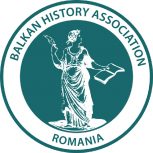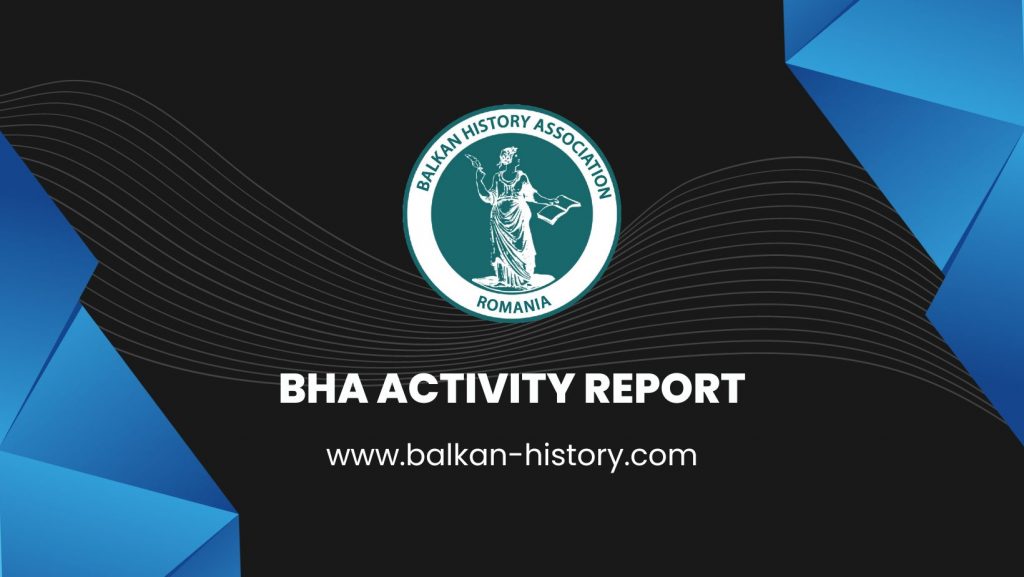Considering the purpose and objectives of the Balkan History Association (Bylaws, Ch. II, Art. 5. and Ch. III, Art. 6), focused on developing, promoting, and publishing interdisciplinary research (works) in the field and sub-disciplines of the history and culture in the Balkan region; collaboration with pre-university, higher education and academic institutions; organization of the scientific meetings; collecting books for a library; providing methodological consultations in the field of research, academic exchange, etc., the following activities were carried out during the year of 2021:
Publications
Journals (published)
Hiperboreea, Vol. 8, No. 1, 2021, Published by: Penn State University Press
Hiperboreea, Vol. 8, No. 2, 2021, Published by: Penn State University Press
Edited Volumes (published)
The Romance-Speaking Balkans: Language and the Politics of Identity, ed. by Annemarie Sorescu-Marinković, Mihai Dragnea, Thede Kahl, Blagovest Njagulov, Donald L. Dyer, and Angelo Costanzo. Leiden: Brill, 2021. ISBN: 978-90-04-45617-4, ISBN: 978-90-04-45277-0.
Jill Mitchell, The Religious World of Quintus Aurelius Symmachus. Budapest: Trivent, 2021. ISBN 978-615-81689-6-0; eISBN 978-615-81793-7-9.
Iakovos Menelaou, The Rhetoric of the Cyprus Problem: Idealism, Nationalism, Realism. Budapest: Trivent, 2021. ISBN 978-615-81821-3-3; eISBN 978-615-81821-4-0.
Forthcoming volumes – Peter Lang (BHA Book Series)
Old and New Insights on the History of Intelligence and Diplomacy in the Balkans, ed. by Bogdan Teodor, Jordan Baev, Matthew Crosston, Mihaela Teodor.
Volumes which are currently edited – 16
- Cyrillic Manuscripts: a Typology of the Text, Localization of Text Creation, Text Creators, ed. by Anca Libidov, Stanislav Voloshchenko, Andrea Radošević, Alice Isabella Sullivan, Antoaneta Krastanova A. Granberg,Georgi Parpulov.
- Parks in the Balkan Capitals: Leisure, Urban Impact, Monuments, Stories, and Significance, ed. by Ana-Maria Lepăr, Alexandra Milanova, Miroslav Šilić.
- Deportation in East Central Europe in the 20th Century – Snapshots of Invisible Incarceration, ed. by Mihaela Martin, Ludmila Cojocaru, Claudia-Florentina Dobre, Blagovest Njagulov, Michael Sagatis, Dallas Michelbacher.
- Material Culture and Everyday Politics in the Balkans (19th-21st Century), ed. by Manolis G. Varvounis, Nantia Macha, Dorina Onica, Tudor Dinu, Gordana Blagojević, Andrew Farrington.
- Cyrillic Manuscripts: From Medieval to Digital, ed. by Alexander Okhrimenko, Svetlana Šašerina, Małgorzata Skowronek, Dușița Ristin, Andrej Bojadžiev, Mary Allen “Pasha” Johnson, Elka Jaceva-Ulcar.
- The Armed Conflict on the Dniester: Political and Social Implications for the Republic of Moldova, ed. by Eugen Străuțiu, Victor Juc, Robert E. Hamilton, Steven D. Roper, Dareg Zabarah-Chulak, William E. Crowther.
- Greece Reborn: Aspects of Modern Greece, 1821-2021, ed. by Ioannis E. Kotoulas, Radu Tudorancea, Yura Konstantinova, Tudor Dinu, Lucien Frary, Goran Vasin.
- The Settlement of Romanian Territory with Regard to the Banat and Transylvania from the 18th to the 20th Century, ed. by Michal Franko, Thomas Lorman, Attila Varga.
- Wallachian Colonization in the History of East Central Europe (14th-17th Centuries), ed. by Miloš Marek, Grzegorz Jawor, Adinel C. Dincă, John Polemikos.
- Roman Mines in Southeast Europe During the Principate, ed. by Amra Šačić Beća, Florian Matei-Popescu, Olga Pelcer Vujačić, Ivo Topalilov, Nadežda Gavrilović, Ersin Hussein, Filippo Carlà-Uhink.
- Visions of Constantinople: The City and its Peoples, ed. by Jill Mitchell, Susan Fern, Vladimir Crețulescu.
- Cultural, Social, Political, Religious and Economic Relations Between Serbs and Romanians from the Early 18th Century to the Late 20th Century, ed. by Jovana Kolundžija, Aleksandra Đurić Milovanović, Mircea Măran, Otilia Hedeșan, Christene d’Anca.
- Towards a New Typology of Paramilitarism: Balkan and Global Perspectives in Retrospect, ed. by Dmitar Tasić, Spiros Tsoutsoumpis, Stevan Bozanich, Aleksandar R. Miletić.
- Football as a Social Phenomenon in the Balkans, ed. by Teodor Borisov, Dariusz Wojtaszyn, Ed Turner, Maroš Melichárek, Dario Brentin, Tin Mudražija, Marko Begovic.
- Islamic Radicalisation in the Balkans after the Fall of Communism, ed. by Mihai Dragnea, Adriana Cupcea, Joseph Fitsanakis, Darko Trifunovic, John M. Nomikos, Vasko Stamevski.
- Pilgrimage in the Christian Balkan World: The path to touch the sacred and holy, ed. by Dorina Onica, Petko Hristov, Emmanouil Varvounis, Goran-Pavel Šantek, Evelyn Reuter.
BHA Webinars
Saints in the Slavic Christian World (900-1400), Tuesday 9th November 2021, 13:00 – 17:00. Seminar hosted by Lund University, Ghent University and the Balkan History Association. Speakers: Prof. dr. Dieter Stern, University of Ghent and Research fellow, Emil Hilton Saggau, Lund University. The results will be published in a volume by the Balkan History Association and Lung University.
Training course (online) – “Colours of Peace”
The training course which was co-funded by the Erasmus+ Programme of the European Union addressed the needs of both youth and refugees around the world to gain skills and competences like leadership, team-work, critical thinking, along with intercultural competences and problem solving, that will help them fully be included in the European society. The course focused on methods to prevent radicalization and exclusion. The main target group for the course were youth workers and people working with refugees who left the most dangerous war zones around the world. Over 48 participants were selected from countries like Bulgaria, Cyprus, France, Germany, Greece, Italy, Romania, Turkey.
Cultural Programmes and Online workshops
- Online workshop: “Roma from the Republic of Moldova: Between Ethnic and Social Discrimination”, 24 May 2021. Hosted by the Balkan History Association within the project “Colours of Peace”. Speaker: Dr. Ion Duminică, Centre of Ethnology, Institute of Cultural Heritage, Moldova.
- Online workshop: “The Juvenile Offenders Issue – at the Edge of the Discrimination”, 17 May 2021. Hosted by the Balkan History Association within the project “Colours of Peace”. Speaker: Dr. Tsvetelina Tsvetkova, Bulgarian Youth Forum.
Creation of a new book series at Peter Lang: “South-East European History”
Series Editor: Mihai Dragnea (University of South-Eastern Norway)
This single-blind peer reviewed series is published on behalf of the Balkan History Association and comprises original, high-quality disciplinary and interdisciplinary comparative study of South-East Europe from ancient to contemporary times. It welcomes submissions in several formats, including monographs, edited volumes, conference proceedings, and short form publications between 30,000 to 50,000 words (Peter Lang Prompts) on various sub-disciplines of history—political, cultural, military, economic, urban, literary, oral, or the history of science communication—art history, history of religions and archaeology.
Editorial Board: Dan Dana (French National Centre for Scientific Research), Valeria Fol (Institute of Balkan Studies and Centre of Thracology, Bulgarian Academy of Sciences), Adrian Ioniță (“Vasile Pârvan” Institute of Archaeology, Romanian Academy), Zoran Ladić (Institute for Historical and Social Sciences, Croatian Academy of Sciences and Arts), Marco Cassioli (University of Aix-Marseille), Ivan Biliarsky (Institute of Historical Studies, Bulgarian Academy of Sciences), Alice Isabella Sullivan (Tufts University), Mihai-D. Grigore (Leibniz Institute of European History in Mainz), Colin Heywood (University of Hull), Gábor Kármán (RCH Institute of History, Budapest), Nathalie Clayer (Center for Turkish, Ottoman, Balkan, and Central Asian Studies, Paris), Hans-Christian Maner (Johannes Gutenberg University Mainz), Katrin Boeckh (Leibniz Institute for East and Southeast European Studies, Regensburg), Lavinia Stan (St. Francis Xavier University), Irina Livezeanu (University of Pittsburgh).
Agreements of Cooperation – 13
- Center for International Politics and Post-Conflict Research at the Faculty of Political Sciences, University of Sarajevo, Bosnia and Herzegovina.
- Institut für Musikwissenschaft (Department for Musicology) at the University of Leipzig, Germany.
- Institute of Church History, affiliated with the Catholic Faculty of Theology, University of Zagreb, Croatia.
- Diplomatic Academy affiliated with the University of Nicosia, Cyprus.
- NGO Institute for Political Studies (IPS), Tirana, Albania.
- Institute of History of the Jagiellonian University, Krakow, Poland.
- Department of History within the Faculty of Croatian Studies, University of Zagreb, Croatia.
- Laboratory of Folklore and Social Anthropology, Department of History and Ethnology at Democritus University of Thrace in Komotini, Greece.
- Institute of History of the Philosophical Faculty, University of Hradec Králové, Czech Republic.
- Faculty of History and Philosophy from the Borys Grinchenko University in Kiev, Ukraine.
- Department of Security Studies (DSS) of the Faculty of Political Science and International Relations, Matej Bel University in Banská Bystrica, Slovakia.
- Faculty of Political Sciences (FPS), Marmara University in Istanbul, Turkey.
- Centrul de Excelenţă în Studiul Imaginii (Center of Excellence in the Image Study), University of Bucharest (CESI-UB), Romania.
BHA Library
The Balkan History Association received from partners and collaborators 285 books consisting of monographs, edited volumes, conference proceedings, primary sources, and journals. The collection is currently organized into a library at the Department of Ancient History, Archaeology, and Art History within the Faculty of History, University of Bucharest. A list of publications will be available on the BHA website.
BHA President,
Mihai DRAGNEA

